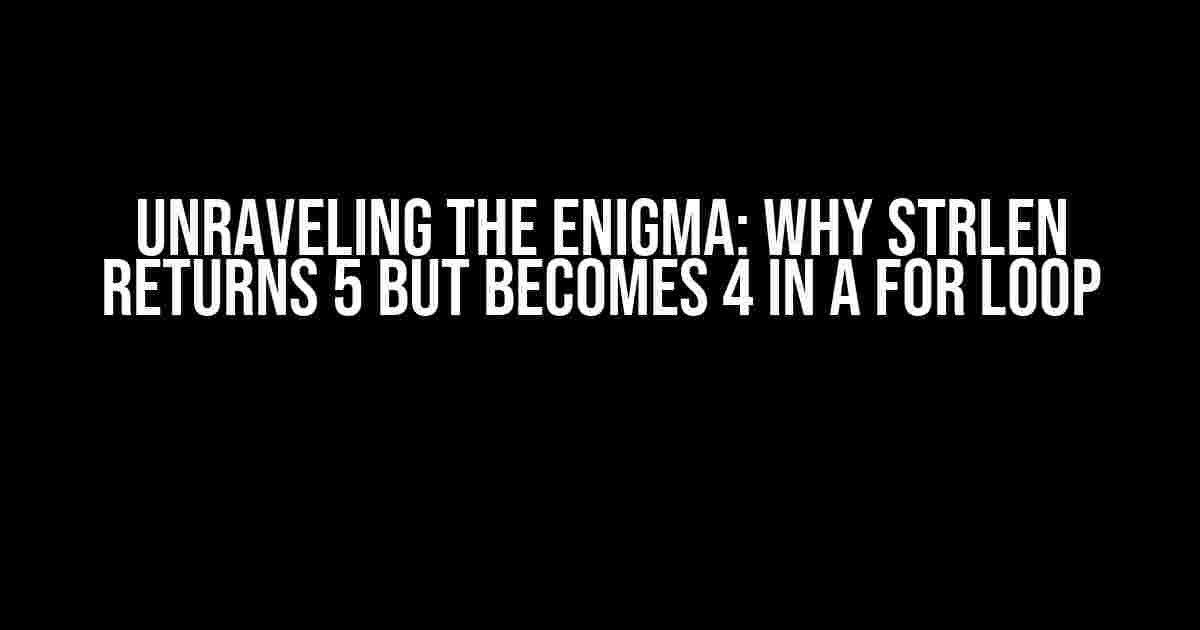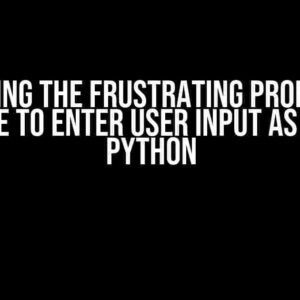Have you ever stumbled upon a peculiar phenomenon where the `strlen` function returns a value of 5, only to magically transform into 4 when used within a `for` loop? You’re not alone! In this article, we’ll delve into the mysteries of C programming and uncover the reasons behind this baffling behavior.
The strlen Function: A Brief Overview
The `strlen` function is a staple in C programming, used to calculate the length of a null-terminated string. It takes a string as an argument and returns the number of characters preceding the null character (`\0`). For instance:
char str[] = "hello";
int length = strlen(str);
printf("%d", length); // Output: 5In this example, the `strlen` function correctly returns 5, which is the number of characters in the string “hello” excluding the null character.
The Mysterious Case of the Disappearing Character
Now, let’s consider the following scenario:
char str[] = "hello";
int length = strlen(str);
for (int i = 0; i < length; i++) {
printf("%c", str[i]);
}
You’d expect the output to be “hello”, but surprise! The output is actually “hell”. What sorcery is at play here?
The Culprit: The Null Character
The reason for this unexpected behavior lies in the way `strlen` calculates the string length. When you use `strlen` in a `for` loop, the loop iterates up to the value returned by `strlen`, which includes the null character (`\0`). In our example, `strlen` returns 5, but the loop iterates from 0 to 4, effectively skipping the null character.
| Index | Character |
|---|---|
| 0 | h |
| 1 | e |
| 2 | l |
| 3 | l |
| 4 | o |
| 5 | \0 |
As the loop iterates from 0 to 4, it doesn’t include the null character at index 5, resulting in the output “hell” instead of “hello”.
How to Avoid the Pitfall
To prevent this unexpected behavior, you can modify the loop to exclude the null character:
char str[] = "hello";
int length = strlen(str);
for (int i = 0; i < length - 1; i++) {
printf("%c", str[i]);
}
printf("%c", str[length - 1]); // Print the last character (excluding null)By using `length – 1` in the loop condition, we ensure that the loop iterates up to the last character of the string, excluding the null character.
Best Practices for Using strlen
To avoid similar issues in the future, follow these best practices when using `strlen`:
- Always be mindful of the null character when using `strlen` in loops or array indexing.
- Use `strlen` with caution when working with strings that may contain embedded null characters.
- Verify that the string is properly null-terminated before using `strlen`.
- Consider using alternative string manipulation functions, such as `strncpy` or `strncat`, which can help avoid null character-related issues.
Common Pitfalls and Solutions
Here are some common pitfalls and solutions related to `strlen` and loops:
Pitfall 1: Off-by-One Error
Problem:
char str[] = "hello";
int length = strlen(str);
for (int i = 0; i <= length; i++) {
printf("%c", str[i]);
}Solution:
char str[] = "hello";
int length = strlen(str);
for (int i = 0; i < length; i++) {
printf("%c", str[i]);
}Pitfall 2: Null Character Omission
Problem:
char str[] = "hello";
int length = strlen(str);
for (int i = 0; i < length; i++) {
printf("%c", str[i]);
if (str[i] == '\0') break;
}Solution:
char str[] = "hello";
int length = strlen(str);
for (int i = 0; i < length; i++) {
printf("%c", str[i]);
if (str[i] == '\0') continue;
}Conclusion
In conclusion, the seemingly inexplicable behavior of `strlen` in a `for` loop is, in fact, a consequence of the null character’s presence. By understanding the intricacies of `strlen` and taking necessary precautions, you can avoid common pitfalls and ensure that your code behaves as expected.
Remember, in the world of C programming, vigilance is key. Stay alert, and the mysteries of `strlen` will unfold before your eyes!
Happy coding!
Frequently Asked Question
Have you ever wondered why your `strlen` returns a value of 5, but when you use it in a `for` loop, it suddenly becomes 4? Well, wonder no more, friend! We’ve got the scoop for you.
Q: Why does `strlen` return 5 when I print it, but 4 when I use it in a `for` loop?
A: Ah, my friend, it’s because `strlen` returns the length of the string, which includes the null terminator (`\0`) at the end. When you print it, it shows the correct length, but when you use it in a `for` loop, the loop iterates from 0 to `strlen-1`, effectively skipping the null terminator, making it seem like the length is 4!
Q: But why does it count the null terminator in the first place?
A: The null terminator is a special character that marks the end of a string in C. It’s included in the length count because `strlen` needs to know where the string ends. It’s like the final punctuation mark on a sentence – it tells the compiler, “Hey, this is the end of the string!”
Q: So, how do I fix this issue in my code?
A: Easy peasy! Just remember to adjust your loop counter to `strlen-1` to account for the null terminator. For example, `for (int i = 0; i < strlen(myString) - 1; i++)`. Voilà! Your loop will work as expected.
Q: What if I forget to adjust the loop counter?
A: Uh-oh! If you don’t adjust the loop counter, you might end up accessing memory outside the bounds of your string, which can lead to all sorts of nasty errors and bugs. So, be sure to double-check your code to avoid any potential issues!
Q: Is this a common gotcha in C programming?
A: Absolutely! This is a classic gotcha that even experienced programmers might overlook. So, don’t worry if you’ve fallen into this trap – just remember to be mindful of the null terminator when working with strings in C.



